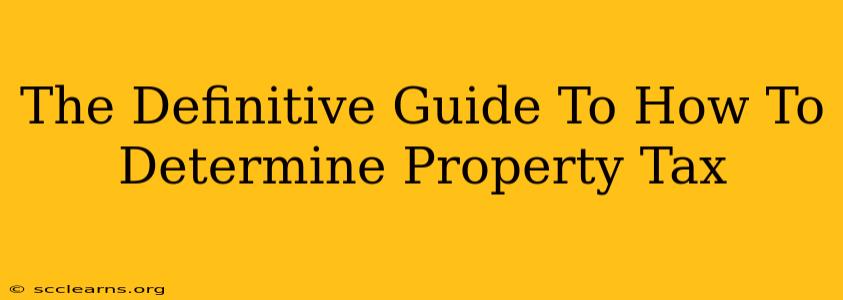Understanding property tax can feel like navigating a maze, but it doesn't have to be. This definitive guide breaks down the process of determining your property tax, empowering you to become a savvy homeowner. We'll cover everything from the basics of assessment to common exemptions and appeals.
Understanding the Foundation: Property Tax Assessment
The cornerstone of property tax calculation is the property tax assessment. This is the official valuation of your property, determined by your local government. The assessment process varies by location, but generally involves:
- Data Collection: Assessors gather information about your property, including its size, location, features (pool, garage, etc.), and recent sales of comparable properties (comps).
- Valuation Methods: Different methods are used to determine value, including:
- Market Value Approach: This compares your property to similar recently sold properties in your area.
- Cost Approach: This estimates the cost of rebuilding your property from scratch.
- Income Approach: This is more relevant for income-producing properties, estimating value based on potential rental income.
- Assessment Review: After the assessment is complete, you typically have a chance to review it and challenge it if you believe it's inaccurate.
Key takeaway: Your property's assessed value directly impacts your property tax bill. An accurate assessment is crucial for fair taxation.
Calculating Your Property Tax: The Formula
Once your property is assessed, the calculation of your property tax is relatively straightforward. The basic formula is:
Property Tax = (Assessed Value / 100) x Tax Rate
Let's break it down:
- Assessed Value: This is the value determined by your local assessor's office, as discussed above.
- Tax Rate (Millage Rate): This is expressed as a dollar amount per $100 of assessed value (or sometimes as mills, where 1 mill = $0.001). Your local government sets this rate, often to fund public services like schools, roads, and public safety.
Example:
If your assessed value is $200,000 and the tax rate is $2.50 per $100 of assessed value, your property tax would be:
($200,000 / 100) x $2.50 = $5,000
Factors Influencing Your Property Tax
Several factors beyond the assessed value can influence your final property tax bill:
- Property Tax Exemptions: Many jurisdictions offer exemptions that reduce your taxable value. Common exemptions include those for seniors, veterans, and individuals with disabilities. Research your local options!
- Tax Credits: Unlike exemptions, credits directly reduce the amount of tax owed. These credits often target specific situations or demographics.
- Local Levy Rates: The tax rate itself can fluctuate depending on local budget needs and voter-approved initiatives.
Appealing Your Property Tax Assessment
If you believe your property's assessed value is too high, you have the right to appeal. This usually involves:
- Filing a Formal Appeal: Follow your local jurisdiction's guidelines for filing an appeal. This often involves submitting documentation supporting your claim.
- Presenting Evidence: Gather evidence to demonstrate the assessor's valuation is inaccurate. This could include comparable property sales, professional appraisals, or evidence of property damage.
- Negotiation or Hearing: Depending on your location, you might negotiate with the assessor's office or attend a formal hearing to present your case.
Proactive Property Tax Management
Don't wait until tax season to think about your property taxes. Stay informed:
- Monitor your assessment: Regularly check your property's assessed value online.
- Understand your local tax rates: Keep track of changes in your local millage rate.
- Take advantage of exemptions and credits: Explore all potential tax relief programs.
By understanding the process of determining property tax, you can ensure you're paying a fair share and proactively managing your finances. Remember, accurate information and timely action are key to successful property tax management.

